146 start with P start with P

A Psychiatric Primer for the Veteran's Family and Friends was first published in 1945. Minnesota Archive Editions uses digital technology to make long-unavailable books once again accessible, and are published unaltered from the original University of Minnesota Press editions.
For the individual as for the nation, war is not done with when the guns stop firing and the soldiers come home. Its continuing effects are easily recognized in the lives of the maimed and the disfigured; they are no less distressingly real for those whose injuries are of the mind and emotions and nerves. And of these a half million or more have been discharged from the armed services.
What can families and friends do to help these men on their road back to health? A Psychiatric Primer answers this question in direct and practical terms. Affection and the best of intentions cannot alone tell one how to deal wisely and effectively with war torn nerves in a husband, son, friend, or fellow worker. One needs also intelligent understanding and a sound knowledge of the truly helpful attitude and behavior in a given situation. It is this understanding and this knowledge that A Psychiatric Primer offers to families and friends of returned servicemen.
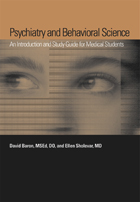
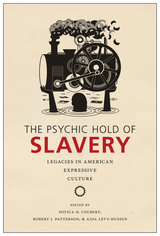

Unveils the psychoanalytic undercurrents of contemporary Islam
Fethi Benslama is a psychoanalyst who, although a secular thinker, identifies himself as a person of Muslim culture who rejects ready-made explanations for Islamic fundamentalism. In that spirit, Benslama demythifies both Islam and Western ideas of the religion by addressing the psychoanalytic root causes of the Muslim world’s clash with modernity and subsequent turn to fundamentalism.
Tracing this ideological strain to its origins, Benslama shows that contemporary Islam consists of a fairly recent hybridization of Arab nationalism, theocracy, and an attempt (both naïve and deadly) to ground science in faith. Combining textual analysis and Lacanian and Freudian psychoanalysis, he examines Islam’s foundation, providing fresh readings of the book of Genesis, the Koran, The Arabian Nights, and the work of medieval Islamic philosophers.Refreshingly, Benslama writes without ideological bias and undoes the simplistic, Western view of Islam while refusing to romanticize terrorism or Muslim extremism. This is a penetrating work that reveals an alternate history of the Islamic religion and opens new possibilities for its future development.
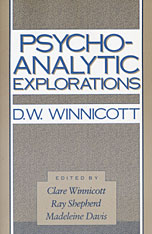
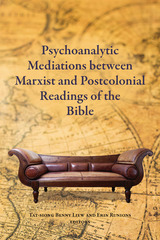
The first sustained conversation between Marxism, postcolonialism, and psychoanalysis in biblical studies
This volume pursues critical readings of the Bible that put psychoanalysis into conversation with Marxist and postcolonial criticism. In these essays psychoanalysis provides a way to mediate between Marxism's materialist groundings and postcolonialism's resistance against empire. The essays in the volume illuminate the way empire has shaped the biblical text by looking at the biblical texts' silences, ruptures, oversights, over-emphases, and inexplicable elements. These details are read as symptoms of a set of oppressive material relations that shaped and continue to haunt the text in the ascendancy of the text in the name of the West.
Features:
- Essays and responses from multiple perspectives and geographical locations, including Africa, Australia, Oceania, Latin America, and North America
- Psychoanalysis that considers how the traumas of colonialism manifest both materially and psychically
- Close readings of biblical texts


The book follows major themes, highlighting the similarities and differences among influential thinkers and schools of thought. At the same time, Psychoanalytic Theory is structured so that the chapters can be read in any order. Each one includes an introductory overview and summary, as well as biographical and historical material for each theorist discussed. This book is an essential starting point for any exploration of the contribution of psychoanalysis to contemporary theory.

Five chapters show how differing psychobiographical approaches can illuminate the lives of Richard Nixon, Nathaniel Hawthorne, Eleanor Marx (Karl Marx’s youngest daughter), author and feminist Vera Brittain, psychologist Henry Murray, and Sigmund Freud (whose peculiar relationship to Leonardo da Vinci shaped and distorted the first psychobiography every written). Two chapters concentrate on the analysis of life histories collected from contemporary American adults at mid-life crises, and the remaining three chapters provide bold new conceptual and methodological perspectives from which to view the study of individual lives and life stories.
This landmark volume promises to make a major contribution to the growing literature on biography and personality.
Contributors. Irving E. Alexander, James William Anderson, Leslie A. Carlson, Rae Carlson, Alan C. Elms, Carol Franz, Lynne Layton, Dan P. McAdams, Richard L. Ochberg, George C. Rosenwald, William McKinley Runyan, Abigail G. Stewart, Jacquelyn Wiersma, David G. Winter

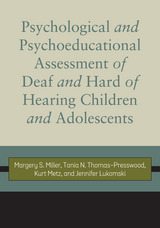
Authors Margery S. Miller, Tania Thomas-Presswood, Kurt Metz, and Jennifer Lukomski bring a wealth of knowledge and experience to this in-depth treatment of topics essential to educators and school psychologists. They cover such critical areas as test construction and measurement; the diversity in American Deaf culture; the role of parents in the assessment process; neuropsychological assessments; nonverbal methods for assessing intelligence; and the need for sign language competency when testing cognitive and language skills.
The text concludes with recommendations for the development of valid and reliable tests for all students who are deaf and hard of hearing.
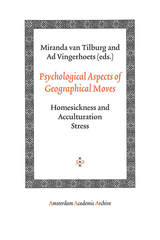
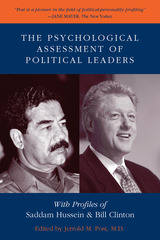
In an age when world affairs are powerfully driven by personality, politics require an understanding of what motivates political leaders such as Hussein, Bush, Blair, and bin Laden. Through exacting case studies and the careful sifting of evidence, Jerrold Post and his team of contributors lay out an effective system of at-a-distance evaluation. Observations from political psychology, psycholinguistics and a range of other disciplines join forces to produce comprehensive political and psychological profiles, and a deeper understanding of the volatile influences of personality on global affairs.
Even in this age of free-flowing global information, capital, and people, sovereign states and boundaries remain the hallmark of the international order -- a fact which is especially clear from the events of September 11th and the War on Terrorism.
Jerrold M. Post, M.D., is Professor of Psychiatry, Political Psychology, and International Affairs, and Director of the Political Psychology Program at George Washington University. He is the founder of the CIA's Center for the Analysis of Personality and Political Behavior.

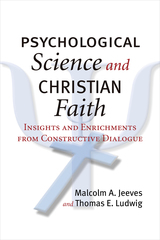
Because Christianity and psychology deal with different levels of truth and speak vastly different languages, efforts to unify them often create more problems than they solve. What is needed is a better way to think about the relationship—an approach that does justice to the emerging insights from psychological science and biblical scholarship and that can enrich our understanding of both. In this volume, two accomplished psychologists show how this complementary dialogue can unfold, giving us a broader, deeper understanding of ourselves, our relationships, and our place in the cosmos.
.
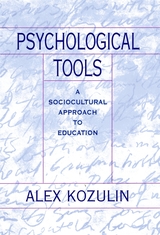
The concept of "psychological tools" is a cornerstone of L. S. Vygotsky's sociocultural theory of cognitive development. Psychological tools are the symbolic cultural artifacts--signs, symbols, texts, formulae, and most fundamentally, language--that enable us to master psychological functions like memory, perception, and attention in ways appropriate to our cultures. In this lucid book, Alex Kozulin argues that the concept offers a useful way to analyze cross-cultural differences in thought and to develop practical strategies for educating immigrant children from widely different cultures.
Kozulin begins by offering an overview of Vygotsky's theory, which argues that consciousness arises from communication as civilization transforms "natural" psychological functions into "cultural" ones. He also compares sociocultural theory to other innovative approaches to learning, cognitive education in particular. And in a vivid case study, the author describes his work with recent Ethiopian immigrants to Israel, whose traditional modes of learning were oral and imitative, and who consequently proved to be quick at learning conversational Hebrew, but who struggled with the reading, writing, and formal problem solving required by a Western classroom. Last, Kozulin develops Vygotsky's concept of psychological tools to promote literature as a useful tool in cognitive development.
With its explication of Vygotsky's theory, its case study of sociocultural pedagogy, and its suggested use of literary text for cognitive development, Psychological Tools will be of considerable interest to research psychologists and educators alike.

This book offers an analysis of ten works by the leading twentieth-century Japanese novelist Natsume Soseki (1867–1916), by one of Japan's most distinguished psychiatrists. Dr. Takeo Doi, whose Amae no Kozo is well known in the West in its English translation, The Anatomy of Dependency, describes the principal characters of Soseki's novels from a psychological point of view, treating them as case studies and demonstrating the clarity and accuracy of Soseki's psychological insights.
This volume, one of the few pieces of literary criticism ever translated from the Japanese, will introduce the reader to these novels, some of which are not available in English. Furthermore, the book is a penetrating account of the universal problems faced by individuals coping with a rapidly modernizing society.
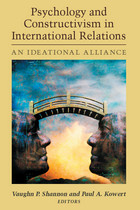
"The conversation between political psychology and constructivism is essential and long overdue. By exploring the interaction of individual cognition and social processes, this 'ideational alliance' more fully explains how ideas work all the way down to shape world politics."
---Theo Farrell, King's College London
"This is a worthwhile and engaging volume. Political psychology is gaining ground as an essential perspective to consider when analyzing international relations, and the book's focus on constructivism provides key insights into the relationship between identity, norms, and behavior---bedrock concepts in understanding the social underpinnings of global politics."
---Mira Sucharov, Carleton University
"An indispensable guide to understanding what distinguishes and what unites psychology and constructivism. A wonderful resource for political psychologists, constructivists, and their critics."
---Jonathan Mercer, University of Washington
Constructivist IR scholars study the ways in which international norms, culture, and identities---all intersubjective phenomena---inform foreign policy and affect the reaction to and outcomes of international events. Political psychologists similarly investigate divergent national self-conceptions as well as the individual cognitive and emotional propensities that shape ideology and policy. Given their mutual interest in human subjectivity and identity politics, a dialogue and synthesis between constructivism and political psychology is long overdue.
The contributors to this volume discuss both theoretical and empirical issues of complementarity and critique, with an emphasis on the potential for integrating the viewpoints within a progressive ideational paradigm. Moreover, they make a self-conscious effort to interrogate, rather than gloss over, their differences in the hope that such disagreements will prove particularly rich sources of analytical and empirical insight.
Jacket illustration © Ocean Photography/Veer


Today's scholars know James's psychology primarily through his great Principles of Psychology (1890), but those who studied the subject at the turn of the century were more apt to learn his view through his Psychology: Briefer Course (1892). Indeed, professors at colleges and universities throughout the United States use this book--which their students labeled "Jimmy" to distinguish it from the larger "James"--in their classes, and more than six times as many copies of the Briefer Course were sold by 1902 as were sets of Principles.
Despite its title, the Briefer Course is more than a simple condensation of the larger work. For example, to the material from Principles James added several chapters on the physiology of the senses that helped mesh his psychology with the other sciences of the period. The earlier chapter title "The Stream of Thought" is replaced here with "The Stream of Consciousness." Psychology: Briefer Course remains a useful and highly readable introduction to James's views on psychology and is an essential source for anyone interested in studying all of his psychological writings.
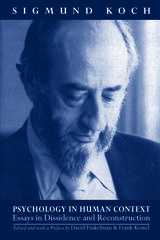
The broad scope of essays in Psychology in Human Context—which began as the basis for the eagerly anticipated postscript to Koch's seminal Psychology: A Study of a Science—reveals his writings to be as fresh and relevant today as ever. Carefully edited by two of Koch's close associates, this collection places psychological and philosophical issues in the context of twentieth-century thought and provides intellectual and moral signposts for future travelers in what Koch regarded as the irreducibly rich and human realm of the psychological studies.
Sigmund Koch was University Professor of Psychology and Philosophy at Boston University, the editor of the landmark six-volume series Psychology: A Study of a Science (1959-1963) and coeditor of A Century of Psychology as Science. He served as the president of three divisions of the American Psychological Association and was director of the Ford Foundation program in the Humanities and the Arts (1964-1967).
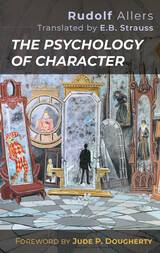

The physical process of birth is no longer as mysterious as it once was. But many unanswered psychological questions still surround the birth of a child. In this remarkably appealing and personable book, pediatrician Aidan Macfarlane takes a careful look at a large number of these important psychological unknowns.
On Macfarlane's agenda: Can a woman's emotional attitude toward pregnancy cause “morning sickness,” influence the smoothness of labor and delivery, or shape the child's behavior after birth? Can the mother-child relationship be adversely affected by separation immediately after birth? Is the quality of the birth experience improved by home delivery? What are the psychological effects of pain-killing drugs on mother and child? What, if anything, does the unborn infant see, hear, and feel inside the womb? Is birth a psychological trauma for the child and, if so, how can it be alleviated?
Although Dr. Macfarlane refuses to provide easy answers to any of these questions, his clear discussion of the available evidence is not without important consequences for the way in which we understand birth and manage it in our society.


"'Is there any other point to which you would wish to draw my attention?' 'To the curious incident of the dog in the night-time.' 'The dog did nothing in the night-time.' 'That was the curious incident,' remarked Sherlock Holmes." The quotation from A. Conan Doyle with which this book begins, is a delightfully appropriate summation of the authors' point of view garnered from their fifteen years of experiments on the psychology of reasoning.
Dr. Wason and Dr. Johnson-Laird are intrigued by the extent to which most individuals can be considered naturally rational thinkers. They present here the surprising results of their comprehensive investigations of how humans draw explicit conclusions from evidence. "Given a set of assertions," the authors write, "to what extent can the individual appreciate all that follows from them by virtue of logic alone, and remain unseduced by plausible, but fallacious conclusions? We are not concerned with whether these assertions are true or false, nor with whether the individual holds them among his beliefs, nor with whether they are sane or silly."
At the core of the Psychology of Reasoning is a vigorous discussion that incorporates various illustrations--some of them humorous, all of them fascinating--of the use of reason under a wide variety of different conditions. Particular emphasis is placed on the difficulties involved in dealing with negatively marked information that must be combined and used with other information for reaching conclusions. Thorough treatment is given as well to the search for plausible contexts that will render anomalous or ambiguous statements "sensible."
The authors have strived to isolate the components of inference, the basic steps of any kind of deductive activity, in order to determine the psychological processes involved in them. What has been the outcome of this research? Dr. Wason and Dr. Johnson-Laird conclude, "our research has suggested that the individual's logical competence may be either enhanced or limited by performance variables. And, of these, content has turned out to be vitally important for revealing, or obscuring structure. At best, we can all think like logicians; at worst, logicians all think like us."
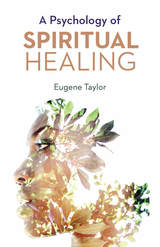
In this comprehensive work, Eugene Taylor uses the tenets of modern psychology, concepts from the world's religions, and a lifetime of spiritual experiences and interior exploration to show how true healing comes from within. Taylor asserts that "consciousness and healing are linked and this connection can best be understood within the context of a growth-oriented psychology of self-realization." Everyone has the capacity to develop a healing personality.
Drawing from such diverse interpreters of transcendental and psychological experiences as William James, Emanuel Swedenborg, Mircea Eliade, Carl Jung, Victor Frankl, and Abraham Maslow, Taylor explores the divisions between science and religious traditions; presents his own personal experiences, including his meetings with the Dalai Lama and Tenzin Norgay; and provides glimpses into the spiritual lives of others who have shared their experiences with him. The function of belief in the alleviation of suffering, the development of self-awareness, and the importance of human relationships form the basis for Taylor's psychology of spiritual healing. This cogent work both provides answers and raises questions for the spiritual seeker.
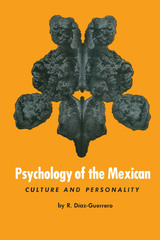
In his quest to understand and describe the behavior of the Mexican, the distinguished Mexican psychologist R. Díaz-Guerrero combines a strong theoretical interest in the relationship of culture to personality with a pragmatic concern for methodology. This collection of essays is rooted both in studies of Mexican psychology as an independent phenomenon and in cross-cultural comparisons of Mexicans, Mexican-Americans, and Anglo-Americans.
Dr. Díaz-Guerrero discusses Mexican attitudes toward sex roles and the family, motivations of the Mexican worker, and other topics. He compares Mexican and American concepts of respect and analyzes the relation between neurosis and the Mexican family structure. He attempts to determine the degree of mental, personal, and social health of urban Mexicans. The importance of basic sociocultural premises, such as "The mother is the dearest person in existence," and "The stricter the parents are, the better the children turn out," is explored. In one essay, Díaz-Guerrero notes the differences in typical reactions to stress in Mexico and the United States, concluding that the American pattern involves active response to stress, whereas the Mexican response tends to be more passive.
Psychology of the Mexican deals with a variety of historical, psychological, biological, social, economic, and anthropological variables, attempting to treat them in a scientific way through the use of carefully constructed questionnaires, with detailed statistical analyses of the results. On the basis of data obtained in this way, the author formulates broad conceptual schemes with immediate application to the understanding of human behavior in real situations. He is particularly intrigued by the way the individual relates to the significant people in his environment. For the Mexican, he says, such interpersonal relationships are the most important part of life; in contrast to the American insistence on liberty and equality, Mexican culture emphasizes affiliation and love.
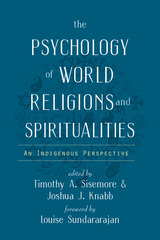
With this goal in mind, editors Timothy Sisemore and Joshua Knabb have made one of the world’s major religions the subject of a separate chapter. In addition, they have arranged for each chapter to be written by a psychologist who practices—or is culturally connected with—that religion. This marks the book’s unique contribution to the field: it is the product of people who have lived the world’s religions, not merely studied them. By taking such a respectful approach, the book promotes an appreciation for the ways that religious belief animates, inspires, and instructs its adherents. Moreover, the indigenous point-of-view of these essays will help scholars identify their own biases when researching religious groups, allowing them to produce more accurate and holistic analyses.
Psychologists understand that religion and spirituality provide meaning and purpose to billions of people around the globe. But the actual experience of these beliefs eludes the grasp of the reductionistic methods of science. With this resource at their side, psychologists in academic and clinical settings will be equipped to understand religious experience from the bottom-up, and honor the beliefs and practices of the people they are trying to help.

Contributors. Elizabeth Jane Bellamy, Teresa Brennan, Rosaria Champagne, Stathis Gourgouris, Catherine Liu, Kathleen McHugh, Robert Miklitsch, Abdul-Karim Mustapha, Laurence A. Rickels, Eugene Victor Wolfenstein, Slavoj Zizek

This book--first published in 1958, and designed for courses on abnormal psychology and psychiatry--is intended to supplement the usual textbook material in abnormal psychology. Papers have been selected to introduce the student to the active and complex enterprise of investigation and hypothesis in this wide field. Conflicting evidence and allegiances, riddles and ingenuity, are displayed in order to stimulate an appreciation of the task of discovery in behavioral science.
Five general areas are represented in the selections: (i) the problem of the effects of early experience on psychological development; (2) psychosomatic disorders and neurosis; (3) schizophrenic psychosis; (4) somatic factors in psychopathology; and (5) the social context and its effects on the phenomena of behavior. Against a background of systematic study, the graduate or undergraduate student will find in the forty-six papers included here an instructive sampling of the periodical literature.
Says Robert W. White in his introduction to the book: "There is no longer an air that the problem of schizophrenia, or of neurosis, or of psychosomatic disorder is going to be solved by a stroke of insight and a simple theory. Where once it was hoped to unlock the secret of a disorder, we now know that we must creep up slowly upon its many secrets and that we must use to the utmost the help provided by scientific method. In this new climate the present book is an indispensable teaching aid."
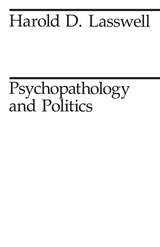
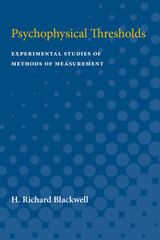

In our high-speed culture, terms like "stressed-out," "Type-A personality," "biofeedback," and "relaxation response" have become commonplaces. More than ever before, we are aware of the relationship between our mental and emotional states and our physical well-being. Findings from the field of psychophysiology, which investigates the reflexive interaction between psychology and physiology, have revised our approach to illness and its prevention and treatment. We know, for example, that stress, combined with other factors, increases vulnerability to heart attack and stroke. Successful treatment must include lifestyle changes to reduce the effects of stress on the body.
In this important text, Kenneth Hugdahl presents a comprehensive introduction to the history, methods, and applications of psychophysiology and explores other areas concerned with the "mind-body interface," such as psychosomatic medicine, behavioral medicine, clinical psychology, psychiatry, neuropsychology, and cognitive neuroscience. By showing how social, behavioral, cognitive, and emotional events are mirrored in physiological processes, he gives us a clearer understanding of complex cognitive processes.
This book illustrates psychophysiology's importance as a research and clinical tool and highlights its many contributions to the assessment and diagnosis of physical disorders. It also provides a framework for extending psychophysiological insights to other areas of psychology and neuroscience.
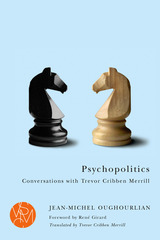
For thousands of years, political leaders have unified communities by aligning them against common enemies. However, today more than ever, the search for “common” enemies results in anything but unanimity. Scapegoats like Saddam Hussein, for example, led to a stark polarization in the United States. Renowned neuropsychiatrist and psychologist Jean-Michel Oughourlian proposes that the only authentic enemy is the one responsible for both everyday frustrations and global dangers, such as climate change—ourselves. Oughourlian, who pioneered an “interdividual” psychology with René Girard, reveals how all people are bound together in a dynamic, contingent process of imitation, and shows that the same patterns of irrational mimetic desire that bring individuals together and push them apart also explain the behavior of nations.

Psychosis and Schizophrenia in Hong Kong covers some of the most serious mental health conditions that top the global disease burden and affect three percent of the general population. However, most research on psychotic disorders is undertaken in the West, and few studies have been systematically carried out in Asia despite global interest in regional differences. This work offers a unique and coherent account of these disorders and their treatment in Hong Kong over the last thirty years.
Chen and his research program’s pioneering work has ranged from the impact of early intervention on outcomes and relapse prevention to the renaming of psychosis to reduce stigma. The studies have contributed to wider international debates on the optimal management of the condition. Their investigations in semantics and cognition, as well as cognition-enhancing exercise interventions, have provided novel insights into deficits encountered in the treatment of psychotic disorders and how they might be ameliorated. The research has also explored subjective experiences of psychosis and elicited unique perspectives in patients of Asian origin.
Each topic is divided into three sections: a global background of the challenges encountered; research findings from Hong Kong; and reflections that place the data in scientific and clinical contexts and offer future directions.

Salvador Minuchin is widely recognized as one of the preeminent family therapists in the world. He has been described, in the American Journal of Psychotherapy, as “a most original innovator, a superb clinician, and an outstanding teacher.” Now, in this pioneering work, he and his co-authors apply the effectiveness of family therapy techniques to an illness that has long resisted treatment—anorexia nervosa.
The purpose of their book is threefold: to develop a new theory of psychosomatic disease, to confirm it with scientific data, and to show it unfolding in actual therapeutic situations with anorectic patients. Drawing upon their own clinical experience and illustrating their views with case studies, they advance a new approach that places the locus of the illness not in the individual but in the family. Their method, which has been highly successful, requires the active involvement of the therapist as an agent of change within the family, stimulating crises that are severe enough to shake up the system and allow it to reform in new and healthier patterns.
This book has revolutionary implications, not just for anorectic patients but for those suffering from all other psychosomatic disease. Whereas such illnesses to date have often eluded treatment, the approach through family therapy holds out the promise of future successes.
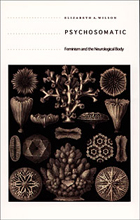

Morton Prince, a debonair Boston neurologist, established the modern American tradition of psychopathology and psychotherapy in the closing decade of the nineteenth century. Born in 1854, two years before Sigmund Freud and five years before Pierre Janet, he criticized and adapted their work to his own particular interests, which were primarily the exploration of hypnosis, multiple personality, and the unconscious. Prince informally headed the most sophisticated group of psychopathologists in the English-speaking world, which flourished in Boston and Cambridge beginning around 1890. He founded the Journal of Abnormal Psychology in 1906 and the American Psychopathological Association in 1910.
The essays in this volume have been chosen by Nathan G. Hale, Jr., to illustrate four major stages in Prince’s career. The first, from 1885 to 1898, saw his development of a dynamic psychotherapy, based on the existence of unconscious mental processes. During the second period, from 1898 through 1911, he made intensive studies of multiple personality. In the third, from 1909 through 1924, he confronted psychoanalysis and behaviorism. During the last period, from about 1914 through 1927, he published his final views of the unconscious, hypnotism, and personality.
Morton Prince’s observations remain important partly because they are so richly detailed, partly because of their dramatic and human interest, but chiefly because they shed light on phenomena that still defy final explanation.
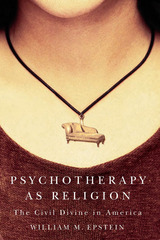
A provocative look at America on the couch.In Psychotherapy as Religion, William Epstein sets out to debunk claims that psychotherapy provides successful clinical treatment for a wide range of personal and social problems. He argues that the practice is not a science at all but rather the civil religion of America, reflecting the principles of radical self-invention and self-reliance deeply embedded in the psyche of the nation. Epstein begins by analyzing a number of clinical studies conducted over the past two decades that purport to establish the effectiveness of psychotherapeutic treatments. He finds that each study violates in some way the standard criteria of scientific credibility and that the field has completely failed to establish objective procedures and measurements to assess clinical outcomes. Epstein exposes psychotherapy’s deep roots in the religious and intellectual movements of the early nineteenth century by demonstrating striking parallels between various types of therapy and such popular practices as Christian Science and spiritualism. Psychotherapy has taken root in our culture because it so effectively reflects our national faith in individual responsibility for social and personal problems. It thrives as the foundation of American social welfare policy, blaming deviance and misery on deficiencies of character rather than on the imperfections of society and ignoring the influence of unequal and deficient social conditions while requiring miscreants to undergo the moral reeducation that psychotherapy represents. This is a provocative, brilliantly argued look at America on the couch. Psychotherapy as Religion is essential reading for anyone interested in the history and current state of mental health.

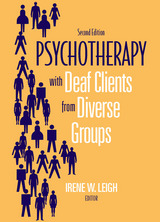
The second edition of Psychotherapy with Deaf Clients from Diverse Groups features the introduction of six new chapters that complement full revisions of original chapters with advances in the field since its initial publication. The first part begins with a new chapter on the current ethical issues relevant to working with deaf clients. In subsequent chapters it provides updated information on the diversity of consumer knowledge, attitudes, beliefs, and experiences. Deaf therapists and their involvement in the Deaf community also are scrutinized in this context.
The revised second part examines psychotherapy for various constituencies, including deaf women; lesbian, gay, and bisexual deaf populations; children of deaf parents; and people with Usher syndrome. Part Three chapters consider interventions with African American deaf clients, American Indians who are deaf, and Asians who are American and deaf. A new chapter expands information on therapy for Latino deaf clients.
The final section incorporates three new chapters on other deaf populations — deaf college students, recipients of cochlear implants, and deaf elderly clients. Also, new information has been added to chapters on the treatment of deaf survivors of sexual abuse and deaf clients with chemical dependency. The last addition to the second edition outlines dialectical behavior therapy for deaf clients, a valuable option for clinicians.
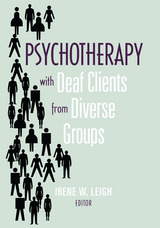
The second edition of Psychotherapy with Deaf Clients from Diverse Groups features the introduction of six new chapters that complement full revisions of original chapters with advances in the field since its initial publication. The first part begins with a new chapter on the current ethical issues relevant to working with deaf clients. In subsequent chapters it provides updated information on the diversity of consumer knowledge, attitudes, beliefs, and experiences. Deaf therapists and their involvement in the Deaf community also are scrutinized in this context.
The revised second part examines psychotherapy for various constituencies, including deaf women; lesbian, gay, and bisexual deaf populations; children of deaf parents; and people with Usher syndrome. Part Three chapters consider interventions with African American deaf clients, American Indians who are deaf, and Asians who are American and deaf. A new chapter expands information on therapy for Latino deaf clients.
The final section incorporates three new chapters on other deaf populations — deaf college students, recipients of cochlear implants, and deaf elderly clients. Also, new information has been added to chapters on the treatment of deaf survivors of sexual abuse and deaf clients with chemical dependency. The last addition to the second edition outlines dialectical behavior therapy for deaf clients, a valuable option for clinicians.
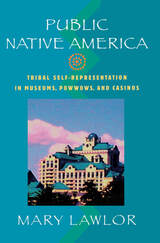
The Native American casino and gaming industry has attracted unprecedented American public attention to life on reservations. Other tribal public venues, such as museums and powwows, have also gained in popularity among non-Native audiences and become sites of education and performance.
In PublicNative America, Mary Lawlor explores the process of tribal self-definition that the communities in her study make available to off-reservation audiences. Focusing on architectural and interior designs as well as performance styles, she reveals how a complex and often surprising cultural dynamic is created when Native Americans create lavish displays for the public’s participation and consumption.
Drawing on postcolonial and cultural studies, Lawlor argues that these venues serve as a stage where indigenous communities play out delicate negotiations—on the one hand retaining traditional beliefs and rituals, while on the other, using what they have learned about U.S. politics, corporate culture, tourism, and public relations to advance their economic positions.
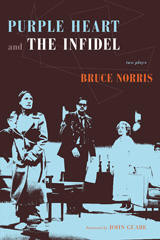
Loosely based on a true story, The Infidel tells of a charismatic and well-respected state Supreme Court justice who is faced with disciplinary action after his out-of-control affair with a young Latina junior staffer. He confers with his friend and attorney as he examines the consequences of his behavior and tries to judge the most difficult case of his life-his own. With dark irony and sharp, cutting dialogue, Bruce Norris explores sexual obsession and the legislation of human behavior.
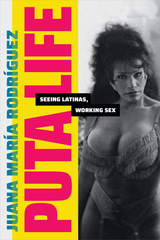
READERS
Browse our collection.
PUBLISHERS
See BiblioVault's publisher services.
STUDENT SERVICES
Files for college accessibility offices.
UChicago Accessibility Resources
home | accessibility | search | about | contact us
BiblioVault ® 2001 - 2024
The University of Chicago Press









